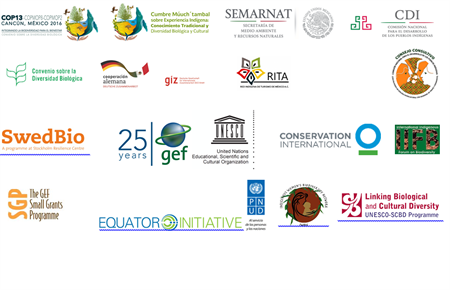Summary
The objective of the “Múuch'tambal” Summit on Indigenous Experience: Traditional Knowledge, biological and cultural diversity is to present and share experiences from indigenous peoples and local communities, Parties and International Organizations on the contributions of traditional knowledge and cultural diversity across the Agriculture, Fisheries, Forestry and Tourism sectors, andfor the conservation and sustainable use of biodiversity. It has been established that many countries with the highest levels of biological diversity, particularly the “mega-biodiverse countries”, also rank among the most culturally diverse. The loss of cultural diversity (including local languages, gastronomy, clothes and medicines) is linked to the loss of biological diversity.
The thirteenth meeting of the Conference of the Parties to the Convention on Biological Diversity (COP 13) will be a great opportunity for participants from around the world to appreciate the value and cultural diversity reflected in many indigenous peoples and local communities and their contributions to the conservation of biodiversity. Participants will also be able to learn more about the importance of respecting, preserving, maintaining, promoting and using traditional knowledge, innovations and practices in the management of local ecosystems. The role of the customary use of biodiversity, for the achievement of the Aichi Targets and the Sustainable Development Goals (SDGs) of the 2030 Agenda for Sustainable Development will also be highlighted.
Mexico, host country of COP 13, is known as one of the most mega-diverse countries in the world because of its biological and cultural diversity; it is home to 68 indigenous peoples that correspond to the 68 languages spoken throughout the whole country and 364 linguistic variants.
The Múuch'tambal Summit will culminate with a regional cultural presentation and celebration of the 20th Anniversary of the International Indigenous on Biodiversity (IIFB).
The result of the work completed during the Múuch'tambal Summit will be included in the negotiations and in a statement to be presented to the Conference of the Parties to the Convention on Biological Diversity (CBD).
Objectives
- To exchange information and experiences on the contributions of traditional knowledge, innovations and practices across the agriculture, fisheries, forestry and tourism sectors; for the conservation and sustainable use of biodiversity; for well-being; and the Aichi targets.
- To exchange experiences on the links between biological and cultural diversity and its implications for public and international policy makers.
- To identify the importance of interactions between biological and cultural diversity for the integration of biodiversity, as well as for the implementation of the Agenda of the CBD, the Strategic Plan for Biodiversity 2011-2020, its Aichi targets, and their interaction with Agenda 2030 and the Sustainable Development Goals.
- To promote the importance and contributions of traditional knowledge, innovations and practices of indigenous peoples and local communities for the use, management and conservation of biodiversity, their customary use and rights, as well as its respect and recognition in all sectors, including agriculture, fisheries, forestry and tourism.
- To promote the strengthening and participation of indigenous peoples and local communities in sharing experience of community governance in the use, management and conservation of biodiversity and the protection of traditional knowledge associated with biodiversity.
- To promote and draw attention to the important role of women, youth and men of indigenous peoples and local communities in the use, management and conservation of biodiversity, as well as the transmission and protection of traditional knowledge.
Participants
The Múuch’tambal Summit will bring together representatives of the Parties, indigenous peoples, local communities, and international organizations, among others.
Methodology
The Múuch’tambal Summit will be using a participatory approach and include the following activities:
Visit to a Mayan Indigenous Community
The Múuch'tambal Summit will begin with a field visit to a Mayan indigenous community, and participants will have the opportunity to visit a Mayan archaeological site and have an Indigenous Opening Ceremony in a Mayan archaeological zone. Later, organized in groups, participants will visit a Mayan community where they can exchange ideas on collective actions related to the objectives of the CBD and show the interrelation among biological and cultural diversity, traditional knowledge, forms of organization and customary use of biodiversity.
Panel discussions and roundtables
Panel presentation of experience from each thematic axis (one experience per region, 7 regions plus Mexico). Each panel will have an expert who will give an introduction to the issues and serve as moderator for the duration of the panel. Themes:
- Traditional Knowledge, innovations and practices (in sectors)
- Use, management and conservation of biodiversity
- Community Governance and biodiversity
All these panels should be regional and gender balanced. Interpretation will be provided in English, French and Spanish throughout the programme.
Discussions
After each panel there will be interactions with the audience through methodology to promote participation ("fishbowl" discussion groups, etc.).
Outcomes
The Summit is expected to provide concrete recommendations on how to improve the participation of indigenous peoples and local communities and their contribution to sustainable development in relation to the integration of traditional knowledge, innovations and practices in all sectors, particularly agriculture, fisheries, forestry and tourism. The recomendations will also address the importance of respecting, preserving, maintaining, promoting and using traditional knowledge, innovations and practices in the management of local ecosystems and respecting the rights of indigenous peoples and local communities while promoting cultural diversity, thus contributing to the implementation of the Agenda of the CBD, the Strategic Plan for Biodiversity 2011-2020, its Aichi targets and its interaction with Agenda 2030 and its ODS.
Partners and Financial Support
